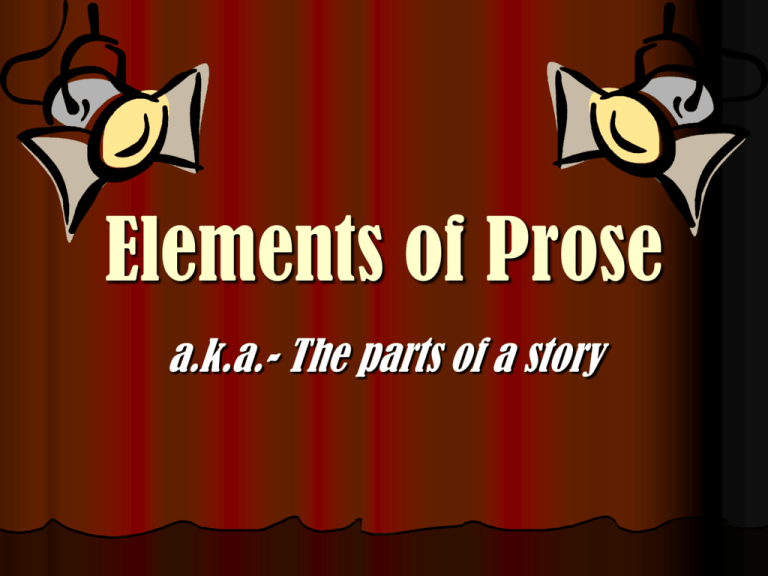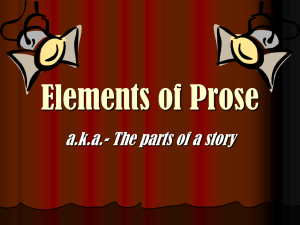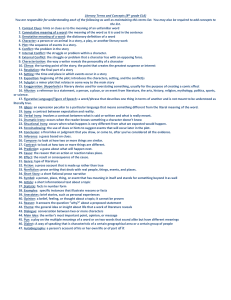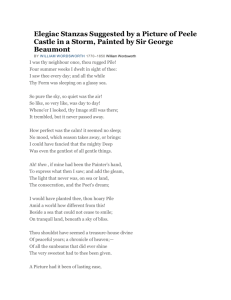Elements of Prose - fourthgradeteam2012-2013
advertisement

Elements of Prose a.k.a.- The parts of a story Prose There are 2 types of writing: prose- anything that is NOT poetry or plays poetry Prose is divided into 2 categories: short story novel Short Story Definition: Fictional story that can be read in one sitting. Example: “A Rose for Emily,” “The Cask of Amontillado,” or “The Most Dangerous Game” Novel Definition: A long prose narrative that must be read in many sittings. Example: To Kill a Mockingbird, The Scarlet Letter, or The Great Gatsby Elements of Prose Plot Character Setting Point of View Theme Irony Symbol Plot The “framework” or “skeleton” of the story; A series of related events that are linked together What Makes Up Plot? Basic Situation (Exposition) 1. - Tells the audience who the characters are and introduces the conflict - Example: “Every Who Down in Who-ville Liked Christmas a lot...” What Makes Up Plot? 2. Rising Action - Complications that arise when the characters take steps to resolve their conflicts “But the Grinch, Who lived just North of Who-ville, Did NOT! The Grinch hated Christmas! The whole Christmas season! Now, please don't ask why. No one quite knows the reason. What Makes Up Plot? 3. Climax: Most exciting or suspenseful moment when something happens to determine the outcome of the conflict. Example: “And the Grinch, with his grinch-feet ice-cold in the snow, Stood puzzling and puzzling: "How could it be so? It came without ribbons! It came without tags! "It came without packages, boxes or bags!" And he puzzled three hours, `till his puzzler was sore. Then the Grinch thought of something he hadn't before! "Maybe Christmas," he thought, "doesn't come from a store. "Maybe Christmas...perhaps...means a little bit more!" What Makes Up Plot? 4. Falling Action: The conflict is in the process of being resolved or “unraveled Example: And what happened then...? Well...in Who-ville they say That the Grinch's small hear Grew three sizes that day! What Makes Up Plot? Resolution: (Denouement) or “Untying the knot” When the story’s problem/conflict is resolved and the story ends Example: “He whizzed with his load through the Endings may be happy or tragic bright morning light And he brought back the toys! And the food for the feast! And he......HE HIMSELF...! The Grinch carved the roast beast!” Freytag’s Pyramid Gustav Freytag was a Nineteenth Century German novelist who saw common patterns in the plots of stories and novels and developed a diagram to analyze them. He diagrammed a story's plot using a pyramid like the one shown here: Character: Revealing Human Nature Character- A person or being in a story that performs the action of the plot. Characterization: The process of revealing the personality of a character in a story. Steps to the Characterization Process 1. 2. 3. 4. 5. A writer can reveal a character in the following ways: Letting up hear the character speak Describing how the character looks & dresses Letting us listen to the character’s inner thoughts and feelings Revealing what other characters in the story think or say about the character Showing us what the character does – how he or she acts *These call on the reader to take the information he or she is given to interpret for himself/herself the kind of character he or she is reading about. This is called INDIRECT CHARACTERIZATION Steps to the Characterization Process Telling us directly what the character’s personality is like: cruel, sneaky, brace, etc. Ex. “You’re a mean one, Mr. Grinch…” 6. This is called DIRECT CHARACTERIZATION Types of Characters Dynamic Character: The character changes as a result of the action of the story. Example- Ebenezer Scrooge, the Grinch Static Character: The character does not change much in the course of the story. Example- Brutus (Julius Caesar); Mama Younger (A Raisin in the Sun) Types of Characters Protagonist: The main character of the story. Can be good or evil Antagonist: The character or force that comes into conflict with the protagonist Can be another person, an animal, a force of nature, society, the character’s own conscience, etc. Setting Defintion: The time and location in which the story takes place Setting Purpose of Setting 1. Gives background information 2. Provides conflict - Man vs. Nature, Man vs. Society 3. Can reveal a lot about someone’s character 4. Provides mood or atmosphere - Mood- the feeling WE get when we read a story 5. Can paint images for the reader - Images – words that call forth the 5 senses Theme Definition: The insight about human life that is revealed in a literary work. The “golden thread” woven throughout the story. -The theme is what the author is saying through the story (it’s a deeper truth about reality) - The plot how he says it : it is the story he uses to get this point across Point of View Definition: The direction from which the writer has chosen to tell the story There are 3 Points of View First Person: One of the characters tells the story; talks directly to the reader 1. - 2. Uses the pronoun “I,” “me,” “we,” or “us” Third Person Limited: The narrator will focus on the thoughts & feelings of just one character - Reader experiences the events of the story through the memory and senses of only one character There are 3 Points of View 3. Third-Person Omniscient- “All-knowing” - An all-knowing narrator who refers to all the characters as “he” and “she.” Knows the thoughts and feelings of ALL of the characters. *The narrator is not necessarily the story’s author* Conflict Definition- It exists when a character is struggling with something or someone Could be a number of things: - Another person, an animal, - an inanimate object- a rock, the weather - The character’s own personality External Conflict External Conflict- Caused by something OUTSIDE the character - Example: an another character, a river, weather, society - Man vs. Man, Man vs. Nature, Man vs. Society Internal Conflict Internal Conflict- Character struggles with some personal quality that is causing trouble - Example: vanity, pride, selfishness, grief - Man vs. Self Foreshadowing Definition: Clues about what is going to happen as the story unfolds Suspense Definition: Anxiety WE feel about what is going to happen next in the story Parody Definition: The imitation of a work of literature, art, or music for amusement or instruction Satire Definition: A kind of writing that ridicules human weakness, vice, or folly in order to bring about social reform. Example: Political cartoons, “A Modest Proposal” Irony Definition: An “unexpected twist” in a story - 3 Types of Irony: 1. Verbal: Someone says one thing but means another - also known as sarcasm -Example: If a woman walks into a job interview and she is sloppily dressed with only two teeth in her head and the interview says, “You have a beautiful smile!” Irony 2. Situational: When a reader expects one thing to happen and the opposite occurs - Example- Everyone knows the sad irony in “Richard Cory.” Why would someone so successful and rich be so unhappy as to kill himself? In a wonderfully ironic letter, George Bernard Shaw celebrates his mother’s death and cremation. Charles Dickens’ character Mr. McChoakumchild is anything but a teacher. Irony 3. Dramatic: When the character in a play thinks one thing is true, but the audience knows better. The audience has inside information that a character does not. - This information usually comes in the form of an aside or a soliloquy. - Example: In Romeo and Juliet, Romeo says that his “grave is like to be his wedding bed.” Little does he know that his marriage will be the cause of his untimely death. We as an audience knows because we heard the prologue at the beginning of the play. Soliloquy Definition: A character stands alone on stage and addresses the world (audience), giving voice to his innermost thoughts and feelings. - To-morrow, and to-morrow, and to-morrow, Creeps in this petty pace from day to day, Example: To the last syllable of recorded time; And all our yesterdays have lighted fools The way to dusty death. Out, out, brief candle! Life's but a walking shadow, a poor player That struts and frets his hour upon the stage And then is heard no more. It is a tale Told by an idiot, full of sound and fury Signifying nothing." — Macbeth (Act 5, Scene 5, lines 17-28) Aside Definition: Words that are spoken by a character in a play to the audience only or to another character only. They are not supposed to be overheard by others on stage. It is meant to let someone in on a secret or for a character to give personal comments about current events in the play. Time, thou anticipatest my dread exploits. “The flighty purpose never is o'ertook Unless the deed go with it. From this moment The very firstlings of my heart shall be The firstlings of my hand. And even now, To crown my thoughts with acts, be it thought and done: The castle of Macduff I will surprise, Seize upon Fife, give to the edge o' the sword His wife, his babes, and all unfortunate souls That trace him in his line. ” More Elements of Prose Tone: The attitude the writer takes toward the subject of a work, the characters in it, or the audience. “I am getting married” Tone Example “The Author To Her Book” Thou ill-formed offspring of my feeble brain, Who after birth did'st by my side remain, Till snatcht from thence by friends, less wise than true, Who thee abroad exposed to public view, Made thee in rags, halting to th' press to trudge, Where errors were not lessened (all may judge). At thy return my blushing was not small, My rambling brat (in print) should mother call. I cast thee by as one unfit for light, The visage was so irksome in my sight, Yet being mine own, at length affection would Thy blemishes amend, if so I could. I washed thy face, but more defects I saw, And rubbing off a spot, still made a flaw. I stretcht thy joints to make thee even feet, Yet still thou run'st more hobbling than is meet. In better dress to trim thee was my mind, But nought save home-spun cloth, i' th' house I find. In this array, 'mongst vulgars may'st thou roam. In critic's hands, beware thou dost not come, And take thy way where yet thou art not known. If for thy father askt, say, thou hadst none; And for thy mother, she alas is poor, Which caused her thus to send thee out of door. Denotation/Connotation Denotation: Dictionary definition of a word - Example: Mom-Female individual who gives birth and physical care to her offspring. Connotation: Feelings people get from hearing or reading a particular word - Example: Mom-Hug, loving, caring, dries tears, role model Denotation/Connotation Dog Denotation: Domesticated, 4-legged canine Connotation: Smelly, fluffy, man’s best friend playful, loyal, protective Denotation/Connotation Fair Denotation: Amusement park which travels; also includes agricultural exhibits Connotation: fun, food, crowded, smelly, carnies








